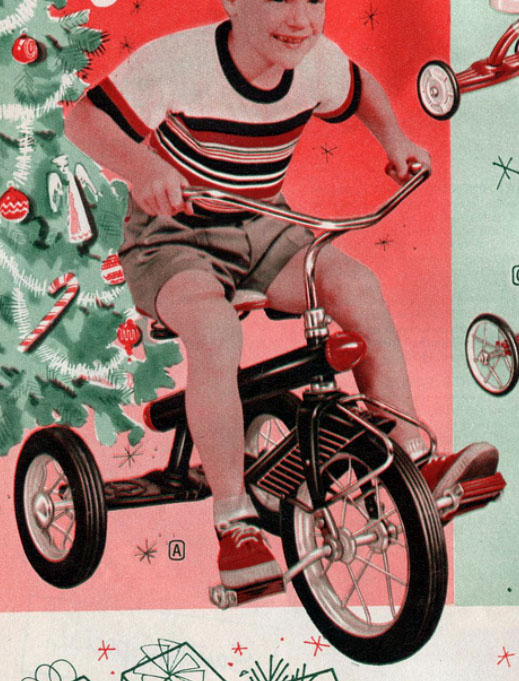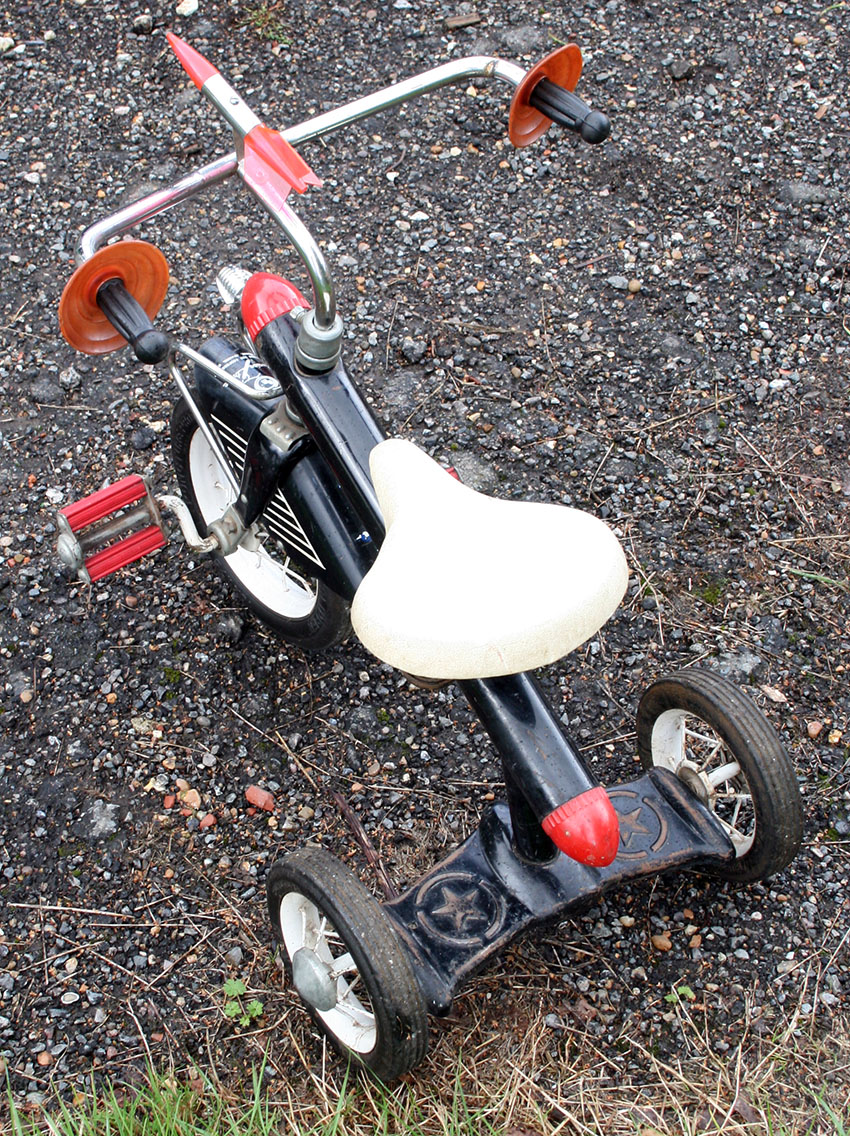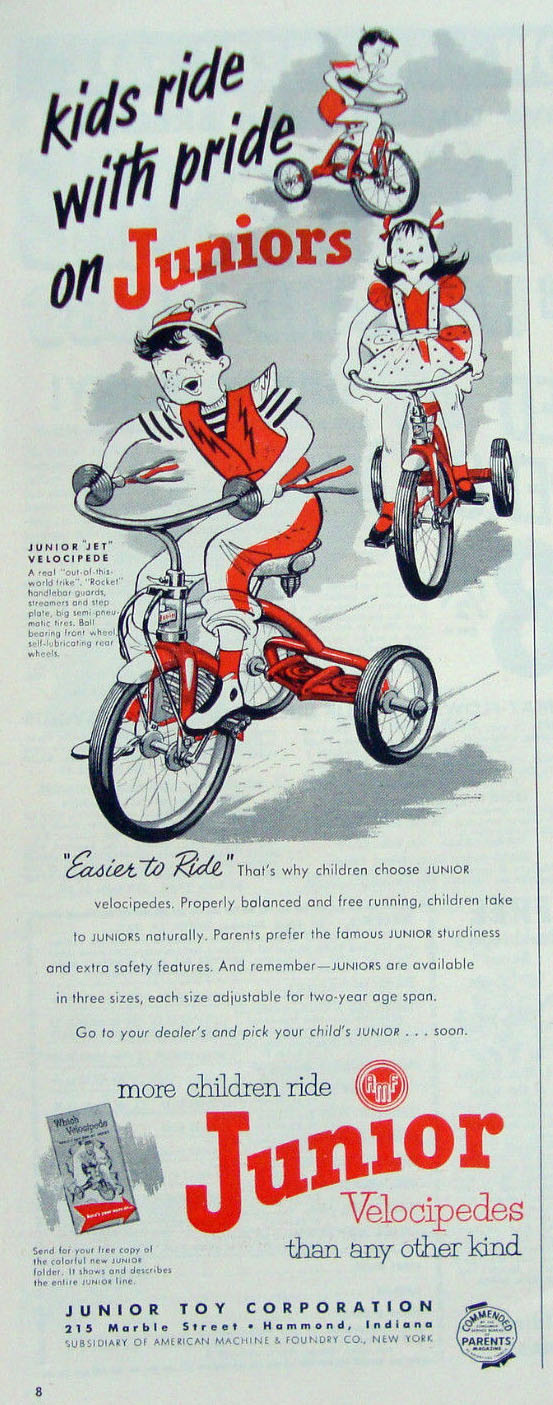

There was base pay and piece work. If you didn’t make the base amount you had to explain why you should get base pay – what complications prevented you from making the base. I did piece work. I turned out 4000 wheels a day. I was at the machine, ready to start at 7am, took a break for coffee at 9am, and was back at work by 9-05am. I tried to have 2400 wheels made by the lunch break; that way I could slow down a bit in the afternoon.
My department was responsible for making the wheels for the toys at Toy Fair (the annual international event in New York at which companies displayed products). I handpicked them and made sure there was a special frame with no flaws. Each set-up man (in a department) was responsible for his product. Salespeople sometimes took sample wheels with them to help them sell products. After Toy Fair, orders would come in. We’d know how many rear wheels, how many front wheels to make. We had to make wheels so far in advance, they were produced and then stored in two boxcars. We sold to Sears, Wards, Western.
At Junior Toy, we had two shifts. A few people worked a third shift to prepare for the next day. There was a warehouse off-site. The warehouse was in a wallpaper factory. We were cramped for space. We’d pile these little bodies (of the pedal cars) one on top of another before they were painted. Junior Toy did research, knew how many kids were born, knew how many toys competitors would sell and what we needed to build. Junior Toy was a well-organised company.
– George W Kiepura, who worked for Junior Toy from 1939 to 1962
During the 1950s and 1960s, AMF Junior was one of the world’s largest makers of children’s riding toys. Introduced to the world at the 1956 New York Toy Fair, the AMF Junior ‘Rocketrike’ was a radically new development of the company’s 1953 ‘Junior Jet’ and 1954 ‘Sky Trike.’ As the company declared, it was the ‘first to break through the old-fashioned Model T design barrier.’ Actually, other companies were also bringing out space ship and rocket tricycles and pedal cars, but AMF Junior cornered the market in the ‘Junior’ range.
There were three models, the basic ‘650 Series,’ the ‘660 Series’ with more elaborate handlebars, and the ‘690 Series’ which also had a tube above the rear step with red rocket caps on the ends, to mimic the style of the main frame tube.


1957 AMF Junior ‘Rocketrike’
Model ‘650 Series’
Front Wheel: 10″
Rear Wheels: 7″
LENGTH: 24″
Designed by Brook Stevens


This ‘650 Series’ Rocketrike is remarkably well-preserved, the nicest I’ve seen. It has been accessorised with a rocket handlebar emblem and space gun attached to the front bars. The handlebar grip protectors were supplied with the more expensive 660 Series and 690 Series, but not this basic model 650 Series. I managed to find a pair to add to this Rocketrike – but to do so I had to buy a complete tricycle that was fitted with them.



JUNIOR TOY CO

Started by two brothers, Einar and Bert Anderson, the ‘Junior Toy Company’ was established in the late 1920s in the Calumet area of Indiana. The company was incorporated on 18th February, 1930, and changed its name to the ‘Junior Toy Corporation’ the following year. It was the fifth largest employer in Hammond, Indiana; at that time, this region was ahead of the Chicago area in industrial expansion, with a ready local supply of steel.
‘Junior Toy Corporation’ was described as a small, family oriented company, and its tricycles were sold by department stores such as Montgomery Ward, Sears, Marshall Field, Pennys and Belknaps. During WW2 the company stopped making toys to do war work such as making land mines, first aid kits, 5-gallon water tanks and portable drilling machines.
The company was purchased in 1952 by American Machine & Foundry (AMF) and relocated to Olney, Illinois. The range of riding toys was now greatly expanded to include new lines. Judging from the evolution of the company’s tricycles through the early fifties, from the 1953 Junior Jet, 1954 Junior Sky Trike, 1955 Junior Sulky Tricycle and the Junior Rocketrike announced at the 1956 New York Toy Fair, the company employed the services of top designers to create this new line in children’s tricycles.






EVOLUTION OF THE ROCKETRIKE

1937 ZEPHYR LAND YACHT: DESIGNER BROOK STEVENS
Born on June 7, 1911, in Milwaukee, Wisconsin, Industrial Designer Brooks Stevens was known for an array of innovations that spanned 60 years. Stricken with polio as a child, his father encouraged him to draw while bedridden. He later attended Cornell University in New York from 1929 to 1933. For a brief time he worked for a firm as a package designer, then opened his own design firm in 1934.
Stevens sphere of influence spread quickly until 1952 when estimated annual retail sales of the products designed by him reached one billion dollars. He was one of the last of a generation of product-design pioneers whose creations paved the way for the everyday gadgetry that people now take for granted. Mr. Stevens continued to teach industrial design at the Milwaukee Institute of Art & Design until his death in 1995.
Brook Stevens and Raymond Loewy were the leading designers of their age. Brook Stevens designed many well-knwon automobiles and, in 1956, added the Rocket Tricycle to his list of designs.


1952 JUNIOR TRICYCLES


1953 JUNIOR JET


1954 JUNIOR SKY TRIKE



1955 JUNIOR SULKY TRICYCLE


1957 JUNIOR ROCKETRIKE ‘SERIES 950’











1957 AMF JUNIOR CATALOGUE COVER

1957 GAMBLES DEPARTMENT STORE CATALOGUE




Junior Toy Co history and top quote from ‘Pedal Cars: Chasing the Kidillac’ by Jane Dwyre Garton
1955 JUNIOR SULKY TRICYCLE & 1957 ROCKETRIKE images with thanks to tricyclefetish.com
Brook Stevens info with thanks to – http://www.excaliburclassics.com/bio.html
FURTHER READING ABOUT BROOK STEVENS – http://blog.hemmings.com/index.php/tag/brooks-stevens/

































